新生代英语基础教程Unit 5
新生代英语基础教程2Unit 5
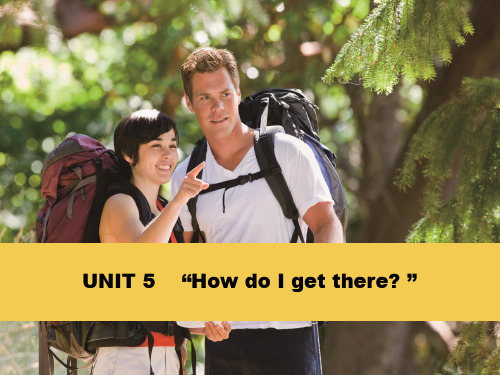
Have you ever played the game “Room Escape” (密室逃脱)? D Complete the clues with words from the boxes to help the three
people get out!
straight under on towards in next to in front of
我得去面包店买点面包卷和蛋糕。
Words & Expressions
block n. 街区;一块(石头、木头等)
e.g. The cinema is down the block.
电影院就在街区的那头。
Words & Expressions
bookstore n. 书店
e.g. He walked on alone to the bookstore.
不锁车就走,等于在找麻烦。
Words & Expressions
in front of 在……前面
e.g. The bus stops right in front of our house.
公交车正好在我家门前停下了。
Words & Expressions
next to 紧挨着;紧靠着
e.g. Peter sat next to Paul on the sofa.
A
B
C
electronic map compass
paper map
D
E
landmarks asking for directions
VOCABULARY BUILDER
A Listen and repeat.
(city) blocks
新生代英语基础教程2_Unit 5_测试卷附答案

Unit TestUnit 5 “How do I get there?”Part 1 Listening ComprehensionSection AA. Listen to the conversation. Then choose the best answer to complete each sentence.1. The man is looking for ________.A. a mallB. a movie theaterC. a library2. The man used to live in ________.A. ArizonaB. MichiganC. WashingtonD.C.3. The man has to walk straight for ________ blocks.A. oneB. twoC. three4. The man will need to walk for around ________ minutes.A. fiveB. fifteenC. twenty-five5. The man also asks about a place to buy ________.A. foodB. a mapC. a bus ticketB. Listen to the conversation. Then choose the best answer to each question below.6. What line is Market Station on?A. The blue line.B. The red line.C. The green line.7. How many times will the woman need to transfer?A. Once.B. Twice.C. Three times.8. How much will the woman save if she takes the subway instead of a taxi?A. 3 dollars.B. 37 dollars.C. 40 dollars.C. Listen to the conversation. Then choose the best answer to each question below.9. What is the woman looking for?A. A Catholic church.B. A mosque.C. A Buddhist temple.10. Which bus does the man suggest the woman take?A. The number 15.B. The number 66.C. The number 82.Listen to the following sentences and write down what you hear on the lines.1.He’s always ____________ about the future. He thinks everything will be OK.2.When the economy is bad, there aren’t many job ____________.3.Why are you in such a ____________? Slow down!4.Anna is very ____________. She always expects the worst.5.There are many different ____________ you need to think about.Part 2 Vocabulary and StructureSection AA. Fill in the blanks with the words or expressions from the box.1.She walked four _________ down High Street.2.They put a screen _________ me, so I couldn’t see what was going on.3. A _________ is a small cheap restaurant that is open all day.4.He felt an overwhelming _________ of loss.5.Playing these games can _________ anti-social behavior.6.The tower on the hilltop is a well-known _________.7.A(n) _________ is someone who collects a particular thing.8.This problem is too _________ to be explained in a few words.9.The British _________ with the French in designing the satellite.10.It was the first time we _________ to ourselves that we were tired.Match the words to the definitions.1.museum2.elevator3.floor4.subway5.between A.into the space separating two or more objectsB.an underground railway system in a cityC. a building in which objects of artistic, cultural,historical or scientific interest are kept and shown to the publicD. a device that carries people up and down insidebuildingsE.level of buildingSection CChoose the best answer to complete each sentence.1. The girl is swimming __________ the pool.A. inB. atC. on2. It is the tallest building __________ the country.A. inB. atC. on3. What a coincidence! They live __________ the same block.A. forB. atC. on4. She will meet him __________ the wedding.A. inB. atC. on5. The bookstore is next __________ the subway station.A. atB. ofC. to6. Walk for three __________ and then turn left.A. blocksB. citiesC. diners7. Put the poster up __________ the wall.A. inB. atC. on8. The weather is very cold __________ the city of Heilongjiang during winter.A. inB. atC. on9. Leo is __________ home now. He’ll be here later.A. inB. atC. on10. There are some teaching materials __________ the table.A. inB. atC. onSection DComplete the passage, using the correct verb form.It’s said that up to 85 percent of the world’s population will be living in cities by the year 2050. So why are so many people deciding 1.__________ (move / to move / moving) to the city? One of the main reasons is that in the city there are more 2.__________ (opportunities / aspects / directions). There are more jobs, more schools and more hospitals. There are also plenty of 3.__________ (pollution / transportation / entertainment) options such as art galleries, museums and movie theaters. However, there are some bad things about city life too. The cost of living is much 4.__________ (higher / high / highest), and it is more competitive and also more crowded. City life is also more dangerous. You are more 5.__________ (likely / like / liking) to be the victim of crime in the city.Part 3 Reading ComprehensionTask 1Read the passage. Choose the best answer.Tips for a happy commuteHigh inner-city rents mean that people spend more time commuting than they ever did before. Here are some tips for you to make your daily commute a bit better.Take the trainStudies show that commuters who travel by train are less stressed than those who travel by bus or car.Turn off your cell phoneWhy start working early? Resist the temptation to study or to check emails on your cell phone. Use this time for yourself.Bring your own entertainmentBring a book or take a puzzle to cool down after a long day at work or college. Or, better still, why not talk to the person next to you?Take a breakIf you use your commute time as a chance to take a break from the pressure of everyday living, you’ll arrive at your destination feeling refreshed.1. What is the purpose of this passage?A. To encourage more people to use public transportation.B. To help you make your commute better.C. To show how to study and commute at the same time.D. To advise readers not to commute.2. According to the passage, why do people spend more time commuting to work and college nowadays?A. Because it’s expensive for them to rent apartments in cities.B. Because commuting is really relaxing and fun.C. Because public transportation is very cheap.D. Because they d on’t have time to walk.3. Why does the passage suggest that you should take the train?A. It’s cheaper.B. It’s less stressful.C. It’s faster.D. It’s more comfortable.4. What does the writer suggest you take on your commute?A. Something to eat.B. Something to drink.C. Your phone.D. A book.5. According to the passage, what should you do with your cell phone on your commute?A. Use it to watch videos.B. Use it to check emails.C. Use it to text your friends.D. Turn it off.Task 2Read the passage. Fill in the blanks with no more than three words.Dear Kim,We’re delighted to tell you that your application has been successfully approved, and you have been selected to join the European scholarship tour this summer. Congratulations!This trip will be a once-in-a-lifetime experience, and I hope you will make the most of it.As you know, we’ll start in Paris, where we will spend one week. We will also visit cities in Austria, Hungary, Italy and Spain in the three-week period. A detailed itinerary is attached.As discussed in the interview, you’ll be required to write a report of your tour on your return.You and your parents are invited to attend our meeting on April 6th in B12 at 7:00 p.m. This will be a good chance for you to ask any questions about the tour, so I hope you can attend.Yours sincerely,Dr. Patricia Smith1.Kim has been selected to take part in a European scholarship tour ____________.2.The tour will start in Paris, and Kim will visit cities in four other ____________.3.The tour will last for ____________.4.When Kim returns from the tour, he will need to ____________.5.There is a meeting about the tour on ____________.Task 3Read the passage. Fill in the blanks with no more than three words.Hi Ben,I’m so pleased you can come to my party.I know you haven’t been to my house before, so I am sending you directions because it’sa little bit complicated.First, you need to take the bus to Green Square. You can ask the bus driver to let you off there. At Green Square, you’ll see a long road with trees on both sides. Walk along the road for about five minutes. When you get to the traffic lights, turn right. Walk for another five minutes until you see a park. My house is just before the park. It’s on Glebe Street and the number is 12.Looking forward to meeting you!Oliver1.Why is Oliver writing to Ben?He wants to tell him how to get to ___________________.2.How can Ben get to Green Square?He needs to ___________________.3.What will Ben see when he gets off the bus?He will see a long road with trees ___________________.4.What should Ben do when he gets to the traffic lights?He needs to ___________________.5.Where is Oliver’s house?It is just ___________________.Unit 5 “How do I get there?”听力脚本Section AA. Listen to the conversation. Then choose the best answer to complete each sentence. Man: Excuse me, miss. Could you please help me with something?Woman: Sure. What’s up?Man: I was wondering if you could tell me where the nearest movie theater is. Woman: The nearest one is probably in the mall.Man: I don’t know where the mall is either. I just moved here from Arizona. Woman: Do you know where Washington Boulevard is?Man: Yes, I do.Woman: Walk straight down Washington Boulevard for three blocks, and then turn left when you get to Michigan Avenue. The mall will be right there. You can’t missit.Man: How long will it take to walk there?Woman: I think it will take around 15 minutes. If you don’t want to walk, you could take the number nine bus.Man: It’s fine. I don’t mind walking. Oh, and one more thing. Are there any good restaurants nearby? I’m starving.Woman: There are a couple of decent places in the mall.Man: OK. Thanks for your help.Woman: Don’t mention it.B. Listen to the conversation. Then choose the best answer to each question below. Woman: Hello, could you please tell me how to get to the farmers’ market?Man: Sure. You see that subway station over there?Woman: The one across the street? Yes, I see it.Man: That’s the red line. Take it to Clark Street Station.Woman: OK, got it.Man: When you get to Clark Street Station, you will need to transfer to the green line.The farmers’ market is at Market Station on the green line.Woman: It sounds quite troublesome. How much would it cost to take a taxi there?Man: From here? It could be quite expensive. Around 40 dollars, I think. A subway ticket will only cost you 3 dollars.Woman: 40 dollars! I think I’ll take the subway. Thanks for your help.Man: No problem.C. Listen to the conversation. Then choose the best answer to each question below. Man: Do you need help with something?Woman: Yes, I am looking for a place of worshipMan: Which religion? There’s a mosque around the corner and a Buddhist temple nearby.Woman: Actually, I’m looking for a Catholic church.Man: There is a Catholic church on Lake Street.Woman: Where exactly on Lake Street? I don’t know this area very well.Man: It’s right near the intersection of Lake Street and Pine Street.Woman: Is there a bus that goes there?Man: Sure. You can take the number 66 or 82. I would recommend the 82; it will arrive there quicker.Woman: How about the number 15? I can see one coming nowMan: I’m not sure about that. You had better ask the driverWoman: OK! Thanks!Section BListen to the following sentences and write down what you hear on the lines.1.He’s always optimistic about the future. He thinks everything will be OK.2.When the economy is bad, there aren’t many job opportunities.3.Why are you in such a rush? Slow down!4.Anna is very pessimistic. She always expects the worst.5.There are many different aspects you need to think about.参考答案Part 1 Listening ComprehensionSection A1. B2. A3. C4. B5. A6. C7. A8. B9. A 10. CSection B1. optimistic2. opportunities3. rush4. pessimistic5. aspectsPart 2 Vocabulary and StructureSection A1. blocks2. in front of3. diner4. sense5. lead to6. landmark7. gatherer8. complicated9. cooperated 10. admittedSection B1. C2. D3. E4. B5. ASection C1. A2. A3. B4. B5. C6. A7. C8. A9. B 10. CSection D1. to move2. opportunities3. entertainment4. higher5. likelyPart 3 Reading ComprehensionTask 11. B2. A3. B4. D5. DTask 21. this summer2. countries3. three weeks4. write a report5. April 6thTask 31. his house2. take the bus3. on both sides4. turn right5. before the park。
let'sgo5,unit5thefuture教案(一)

let’sgo5,unit5thefuture教案(一)Unit 5: The FutureLesson Objectives:•Understand vocabulary related to future technology •Learn and practice using future tenses•Develop speaking and writing skills to discuss future possibilitiesWarm-up Activity:•Have students brainstorm ideas about future technology in small groups.•Ask each group to present their ideas to the class. Vocabulary:1.Future Technology–Robots–Artificial Intelligence–Virtual Reality–Drones2.Verbs related to technology–Develop–Innovate–Communicate–ExplorePresentation:1.Introduce and explain each vocabulary term using simpledefinitions and examples.–Robots: Machines designed to perform tasksautonomously or with minimal human intervention.–Artificial Intelligence: The ability of machines to simulate human intelligence and make decisions.–Virtual Reality: An artificial environment created with computer technology that simulates animmersive experience.–Drones: Unmanned aerial vehicles used for various purposes, such as aerial photography or delivery.2.Show pictures or videos related to each term and elicitresponses from students.3.Have students practice pronouncing and memorizing thevocabulary terms.Grammar Focus:•Introduce different future tenses:–Future Simple: “will + base verb”–Future Continuous: “will be + -ing form verb”–Future Perfect: “will have + past participle verb”•Explain the usage of each future tense and provide examples.•Give students practice exercises to reinforce the understanding and usage of future tenses.Speaking Activity:•Divide students into pairs.•Provide a list of discussion questions related to future technology.•Each pair should take turns asking and answering the questions, using future tenses.•Monitor the conversations and provide feedback on grammar and fluency.Writing Activity:•Ask students to write a short paragraph predicting the future of technology.•Encourage them to use the vocabulary and future tenses learned in this lesson.•Provide sentence starters or prompts to guide their writing.•Collect and review the students’ paragraphs for assessment and feedback.Wrap-up Activity:•Ask students to share interesting ideas or predictions they wrote in their paragraphs.•Have a class discussion regarding the advantages and disadvantages of future technology.•Summarize the main points discussed and encourage students to think about the impact of technology intheir lives.Homework:•Assign a writing task for homework, where students have to imagine and describe a day in their life using future technology.•Remind students to use appropriate vocabulary and future tenses in their writing.Note: You can modify and adapt this lesson plan according to the specific needs and language level of your students. Extension Activities:Listening Activity:•Provide a listening task where students listen to a conversation or a news report about a new technologicaladvancement.•Ask comprehension questions to check their understanding of the content.•Encourage students to take notes while listening and summarize what they heard.Reading Activity:•Assign a reading passage or an article related to future technology.•Have students read the text individually or in pairs. •Ask comprehension questions to assess theirunderstanding of the text.•Discuss the main ideas and opinions presented in the reading.Role-Play Activity:•Divide students into groups and assign them different roles, such as a technology developer, a journalist, ora consumer.•Provide a scenario or a problem related to future technology.•Each group should prepare a role-play dialogue where they discuss and try to find a solution to the givenscenario.•Encourage students to use vocabulary and future tenses in their dialogue.Project:•Assign a project where students have to research and present a futuristic invention or technology.•Students can create a poster, a presentation, or a multimedia project showcasing their chosen technology. •They should include information about the technology, its potential uses, benefits, and drawbacks.•Allow time for students to present their projects to the class.Remember to provide feedback and guidance throughout the lesson to ensure students’ understanding and progress.。
新生代英语基础教程1-Unit-5-电子教案设计.doc

课程名称新生代英语基础教程1课时_________________________________ 班级_________________________________ 专业_________________________________ 教师_________________________________ 系部_________________________________ 教研室________________________________ 教材《新生代英语基础教程1》补充教学资源VOCABULARY BUILDERA 参考译文SHOW TIME>语言解析1.You'll get used to it pretty soon. 你很快会习惯这儿的。
get used to习惯,适应e.g. I have got used to working on challenging tasks.我已经习惯做有挑战性的工作了。
2.We take the Number 3 to Glendale Community College.我们坐3路车到格兰岱尔社区大学。
1)community college 社区大学e.g. My mum went to a community college to learn ikebana after her retirement. 我妈妈退休后,去社区大学学习插花。
2)take the No...乘……路车(公交车)e.g・You can take the No. 6 to the amusement park.你可以乘6路车去游乐园。
3.First we take the Number 11, get off at the Galleria Mall...首先,我们乘11路公交车,在加乐利亚购物中心下车……get off下车e.g. The bus driver got the passengers off in time.公共汽车司机让乘客及时下了车。
新生代英语高级教程2(第二版)全书电子教案Unit-5
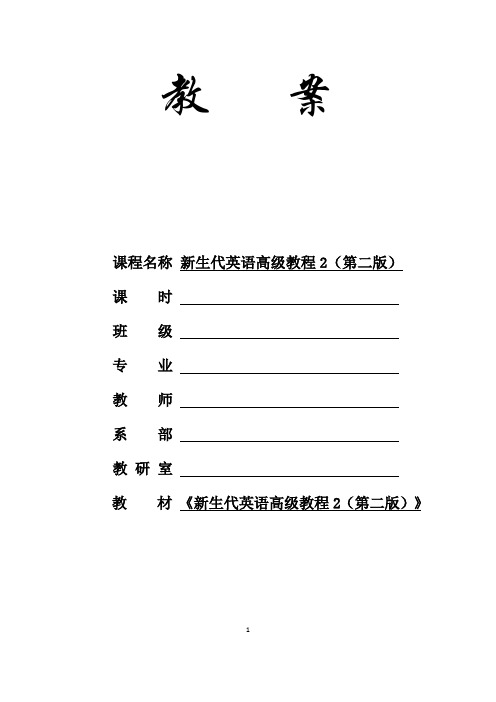
教案课程名称新生代英语高级教程2(第二版)课时班级专业教师系部教研室教材《新生代英语高级教程2(第二版)》123456789补充教学资源Vocabulary Builder参考译文女:除了玩电子游戏和看电影,你还有其他爱好吗?男:有时间的话我会做运动。
女:你在哪里运动?男:几个月前我加入了Bodyfit健身馆。
女:我知道那里。
它在格里尔大街的银行旁边。
你在哪里做什么运动?男:通常我会先在跑步机上做30分钟的有氧运动,接着做30分钟的举重训练。
女:你多久去一次?男:我想一周去四次,但是我太懒了。
上周我只去了两次。
女:那也比我强。
我从不去健身房。
10Show Time参考译文赫克托:你在做什么呢?玛特奥:我在锻炼。
你没看出来吗?赫克托:我知道你在锻炼。
可为什么呢?玛特奥:锻炼对你有好处。
你应该把锻炼当作你日常生活的一部分,赫克托。
赫克托:是,我知道。
但在工作的时候锻炼?玛特奥:为什么不呢?如果你在工作的时候锻炼或者拉伸,你的肌肉就不会感到紧绷。
赫克托:如果我在上班的地方锻炼,会把这些衣服弄得乱七八糟的。
玛特奥:别担心这些衣服。
来,试一下。
赫克托:我该怎么做?玛特奥:先从用手够脚趾开始,然后是膝盖。
最后把手放在臀部。
赫克托:像这样?玛特奥:没错。
1、2、3;1、2、3。
1、2、3;1、2、3。
赫克托和玛特奥:帕特尔先生:你们在做什么?玛特奥:我们在锻炼,帕特尔先生。
为什么不加入我们呢?帕特尔先生:我做不到。
好多年前我就够不到脚趾了。
玛特奥:这对你有好处。
来试试吧。
11帕特尔先生:好吧,那就试试。
但别太快!玛特奥:别担心。
我们慢慢来。
先用手够脚趾。
然后是膝盖。
最后把手放在臀部。
1,2,3;1,2,3。
1,2,3;1,2,3。
帕特尔先生:1,2,3;1,2,3。
好了,玛特奥。
这是我的极限了。
玛特奥:这是个很好的开始。
如果你每天都锻炼,就会变得越来越轻松。
帕特尔先生:每天?玛特奥:保持健康是一种生活方式,帕特尔先生。
最新版新起点大学英语综合教程第一册unit5

最新版新起点大学英语综合教程第一册unit5Unit 5Section A: A Dance with DadTeaching Objectives:1. 理解课文A 和B 的文章大意,了解人们如何通过舞蹈或对舞蹈艺术的追求来抒发对父母的感激之情。
2. 理解和正确运用重点词汇、短语、句型S+V+O 和if 条件句等。
3. 掌握中元音/?/ 和后元音/A:/ 的不同发音。
4. 正确区分现在分词和过去分词。
5. 了解中国传统“舞龙”的历史及象征意义。
Teaching Procedures:Part 1: Warm-up Activities1. Matching:Learn the following words and phrases about different types of dance, and match them to the pictures.2. Conversation: Listen to the conversation. Then practice with your partner, using the words and phrases provided on the right.Part 2: Text A: Fashion ForestⅠ. Background Information1. Beer Barrel Polka“Beer Barrel Polka”, also known as “The Barrel Polka and Roll Out the Barrel”, is a song w hich became popular worldwide during World War II. The music was composed by the Czech musician Jaromír Vejvoda in 1927. In June 1939, “Beer Barrel Polka”, as recorded by Will Glahé, was on the Hit Parade. During World War II, versions in many other languages were created and the song was popular among soldiers, regardless of their allegiances.Ⅱ. Words and phrases1. musclea. v. make one’s way by force 硬挤;费力前行He muscled his way into office. 他费力挤进了办公室。
新生代英语基础教程1第二版unit5听力答案

新生代英语基础教程1第二版unit5听力答案一.Teil 1 Linda fragt Fabio. Hör das Gespräch. Welche Antwort ist richtig?(共10小题,每小题 1.5分,共15分)1.Wie alt bist du? [单选题] *a)13 Jahre.b)14 Jahre.(正确答案)2. Lernst du Englisch? [单选题] *a) Ja, Englisch ist toll.(正确答案)b)Nein, ich lerne Deutsch.3. Ist das dein Handy? [单选题] *a) Ja.b) Nein.(正确答案)4. Wie ist deine Telefonnummer? [单选题] *a) 0155 - 53 52 51.(正确答案)b) 0155 - 51 52 535. Magst du Musik? [单选题] *a) Ja, ich mag Pop.b) Ja, ich mag Hiphop.(正确答案)6. Kennst du Casper? [单选题] *a) Ja.b) Nein.(正确答案)Teil2 Was ist das? Hör die Gespräche.7Frau Milan kommt aus [单选题] *a) Münchenb)Stuttgart(正确答案)8.Sie ist [单选题] *a) verheiratetb)nicht verheiratet(正确答案)9.Sie hat a) ein Kind b) zwei Kinder [单选题] *a) ein Kind(正确答案)b) zwei Kinder10.Frau Milan kann [单选题] *1a) kochen2b) nicht kochen(正确答案)Teil 3 Hör das Gespräch und beantworte die Frage (共10小题,每小题1.5分,共15分)11. Was macht Tina gerade? [单选题] *a) Hausaufgabeb) Klavier üben(正确答案)c) Englisch lernen12.Tina hat Zeit um... [单选题] *a) 16:30.b) 17:30.(正确答案)c) 18:30.13.Marc möchte gern... [单选题] *a) Tennis spielen(正确答案)b) Fahrrad fahrenc) Fußball spielen14.Marc....[单选题] *a) fährt mit dem Fahrrad.b) holt Tina ab.c) trifft Tina am Schwimmbad(正确答案)Du hörst zwei Gespräche. Kreuze richtig(a) oder falsch(b).Gespräch 115.Sarah kocht heute Suppe. [单选题]R(正确答案)F16.Sarah braucht noch Gemüse. [单选题]RF(正确答案)17.Ihr Papa kauft auf dem Markt ein. [单选题] *RF(正确答案)18.Frau Huber isst heute im Restaurant. [单选题] RF(正确答案)19.Der Vater von Tom hat Geburtstag. [单选题]R(正确答案)F20.Andrej muss morgen nicht zur Schule. [单选题] R(正确答案)F。
新生代英语 基础教程2(第二版)教案Unit 5

教案课程名称新生代英语基础教程2(第二版)课时____________________班级____________________专业____________________教师____________________系部____________________教研室____________________教材《新生代英语基础教程2(第二版)》1234567补充教学资源VOCABULARY BUILDER➢参考译文SHOW TIME➢语言解析1.Yo, Hector. This is Mateo.哟,赫克托。
我是玛特奥。
本句是英语电话用语。
81)接电话自我介绍时,可以说:This is … speaking. / It’s… speaking/here. / …speaking.2) 打电话找人,可以说:Hello, is that … speaking? / May I speak to …? / … speaking. / Is … in / there / at home?2. OK, see you in a few minutes. 好的,几分钟后见。
1)in这里用作时间介词,表示“从现在说话时刻算起若干时间以后”,通常用在一般将来时的句子中。
e.g.I’ll come back to see you again in five days. 五天后我再来看你。
It is going to rain in a few minutes. 一会儿天就要下雨了。
2)in用作时间介词,还可以表示“在一段时间以内”。
e.g. Rome wasn’t built in a day. 罗马不是一天建成的。
3. I wouldn’t be surprised if he calls us again.如果他再打电话给我们,我不会感到惊讶。
主句是情态动词,从句是一般现在时。
wouldn’t 表示判断,不会、不可能。
新一代大学英语(基础篇)综合教程2第五单元

新一代大学英语(基础篇)综合教程2第五单元-CAL-FENGHAI.-(YICAI)-Company One1Unit 5 Loving familyiExplore 15-2 iExplore 1: ReadingViewing 1-21)children2)family3)come back4) one another5)talk about6) work it out7)faith8)loveViewing 1-3Reference:Yes. I always turn to my family, especially my parents. for help whenever I run into problems. I have known for a long time that can completely trust my parents and that every piece of advice comes from their unconditional love. Besides, they are much more learned and experienced thanNo. I don't often seek help from my family when Irun into difficulties. My parents are far away from me, so try not to worry them if can solve problems with help from my friends and teachers. But if it is a serious problem, I will talk it over with my parents before making a decision.5-3 iExplore 1: Building your languageWords and expressions 1-1B A A B B AWords and expressions 1-21)on their mind2)takes3)off4)every bit as5) is grateful6)for7)is8)true of9)won10)over11)was bathed in12)look back onCollocations 1-11.Cared2.deliver3. switch4.treat5. remind6. protested7.take8.relievedCollocations 1-21. dim light2. skip school3. positive encouragement4. bright light5.gives pleasure/brings pleasure6. constant encouragementVocabulary learning strate 1-2B F D EC AVocabulary learning strate 1-31. window frames2.child seat3. dishwasher4. can opener5.birthday6.earthquakeLanguage focus 1-2Reference:1. Bending down in front of me, she gave me advice I carry with to this day: "Be friends with everyone.2. Choking back my tears. I tell her, "The doctor said I couldn't have a baby, so your daddy and I decided to adopt a baby. That baby was you."3. They traveled around the country, living in Florida, Texas, and Boston.4. He seemed relaxed, talking to his guests and laughing often.5. My mother worked in a textile factory, weaving knitwear.Banked cloze1)remembers2)quit3)questione4)stimulating5)seed6)remind7)switch8)pleasure9)encouragement10)meaniExplore 25-4 iExplore:ReadingViewing 1-2ACEViewing 1-3Reference:My group members all choose different things for their childhood room. For A. a football fan since childhood,he would like to put posters of some super stars, like Lionel Messi and Ronaldo on the wall. For B, also my roommate, a music fan as a young boy, he prefers to put aset of hi-fi inthe room. For C, she liked dancing very much when she was young, so she wants to have a big mirror to help her practice dancing. For D, she dreamed of wearing a new dress every day when she was in her elementary school, so she would need a large wardrobe badly. Finally. for me, a boy crazy about racing cars, I would put my collection of racing car models in my childhood room.5-5 iExplore 2: Building your languageWords and expressions 1-11. skinny2.faint3. triggered4.emotional5.cherish6.innocentWords and expressions 1-21. one after another2. wear away3. made his way4. set aside5. were accompanied by6. in comparison toCollocations 1-1ABBAABCollocations 1-21. a stack of textbooks2. a clump of trees3. a bunch of flowers4. a sea of information5.an album of stamps6.a mountain of debtsVocabulary learning strategies 1-2BAABBTranslation 1-2Reference:1.我在一个小镇长大,那里的小学距离我家步行需要十分钟,那时孩子们可以回家吃午饭。
新生代英语高级教程2单元测试卷 Unit 5 测试卷附答案

Unit TestUnit 5 “Exercise is good for you.”Part 1 Listening ComprehensionA. Listen to the conversation. Then choose the best answer.1. A. He should watch TV. B. He should study.C. He should sleep.D. He should play football.2. A. An actor. B. A singer.C. A lawyer.D. A fitness instructor.3. A. Flowers. B. A ping-pong paddle.C. A beautiful skirt.D. Anything is OK.4. A. 76 dollars. B. 75 dollars.C. 80 dollars.D. 84 dollars.5. A. She often complains. B. She runs the house.C. She is very happy.D. She doesn’t like basketball.B. Listen to the conversation. Then choose the best answer to each question below.6. What can’t they agree on?A. What film they are going to watch on TV.B. What program they are going to watch on TV.C. When to watch TV.D. Which team is going to win.7. Why is the man so keen to see the match?A. Because it’s the most important match of the season.B. Because it’s exciting to watch the match on TV.C. Because it’s between France and Italy.D. Because his wife enjoys watching it too.8. What does the woman decide to do?A. Watch a football game.B. See a film.C. Watch TV.D. Stay at home.C. Listen to the conversation. Then choose the best answer to each question below.9. Why does the woman refuse the man’s invitation at first?A. Because she has to buy clothes.B. Because she has a meeting to attend.C. Because she has to wash her clothes and clean her room.D. Because she has to paint his room.10. When will they meet to play tennis?A. 1:00 o’clock Friday afternoon.B. 1:00 o’clock Sunday afternoon.C. 2:00 o’clock Friday afternoon.D. 2:00 o’clock Sunday afternoon.Part 2 Vocabulary & StructureA. Fill in the blanks with words or expressions from the boxes.1. Running marathons requires a high level of physical ________.2. James has big ________. He must work out a lot.3. Charles runs on the ________ every morning.4. There are a lot of ________ in fruit.5. Make sure you ________ before exercise, otherwise you may injure yourself.6. I’ll do an hour of slow ________. Would you like to join me?7. Leo will open the debate and I will ________.8. Linda can’t cook and she would just ________ the kitchen.9. He feels very ________, and doesn’t like h imself or anything.10. To qualify for ________, you must be 55 or older.B. Match the words to the definitions.1. routine A. a period of physical exercise, especially as training for a sport2. workout B. the usual or normal way in which you do things3. mineral C. liking something so much that you do not want to stop4. addicted D. reasonable, practical, and showing good judgment5. sensible E. a natural substance such as iron that is present in some foodC. Choose the best answer to complete each sentence.1. I __________ what you said just now.A. am understandingB. to understandC. understand2. They often __________ football after school.A. playingB. playedC. play3. Right now he __________ on a pair of jeans.A. is tryingB. triesC. has tried4. How much __________?A. they do costB. do they costC. cost do they5. Mary and John __________ in a restaurant now.A. wereB. have beenC. are6. Jane is __________ right now.A. exerciseB. exercisingC. exercised7. This book __________ to me.A. is belongingB. belongC. belongs8. I usually ride my bike to school, but today I’m __________ the bus.A. takeB. tookC. taking9. Jenny __________ know what time her plane leaves.A. isn’tB. doesn’tC. hasn’t10. Are you __________ at the moment?A. workingB. workedC. worksPart 3 Reading ComprehensionTask 1 Read the following passage. Choose the best answer.Extreme SportsSome people say extreme sports are dangerous. However, it is reported that regular sports are not all that much safer than extreme ones. Whatever sports you do, if you are not afraid of getting hurt, your enjoyment will be greater. That is especially true for extreme sports. Here is an introduction to three new extreme sports.Ostrich RacingSouth Africa and Jacksonville, Florida, USA are the two homes of ostrich racing. Why dosome guys like to practice this extreme sport? In ostrich racing you can see four or even ten ostriches marching forward at one time, and this is seriously strange. For the supporters, there’s a chance to ride an ostrich. Although if you don’t want to be bitt en or kicked, you can use carts shaped like ostriches for racing instead.BASE JumpingBASE stands for several words—Buildings, Spans, Earth. Spans mean bridges and Earth means cliffs, but then the beauty of BASE jumping is that it’s just launching yourself from anywhere possible with a parachute ready to go. Although BASE jumping dates back to 1978, it has been increasingly popular recently due to Internet videos. Every jump presents a new possibility.Bird Man SuitsThe bird man suit has a few names—the flying squirrel suit, wing-suit and bat-suit. It’s a specially designed suit that lets you glide through the air at controlled speeds, adding a little extra to your usual skydiving experience. This is probably the closest we are going to get to flying. If combining this with BASE jumping, you’ll get some seriously death-defying feelings of excitement!1. According to the passage, why is ostrich racing seriously strange?A. Because ostriches may bite and kick people.B. Because supporters have the chance to ride ostriches.C. Because four or even ten ostriches march forward at a time.D. Because it has two homes, South Africa and Jacksonville, Florida, USA.2. How long have people known about BASE jumping?A. More than 40 years.B. Less than 30 years.C. For nearly half a century.D. For almost 40 years.3. What can be inferred from the passage?A. You can only attend ostrich racing in South Africa.B. BASE jumping has been popular since 1978.C. Sometimes regular sports are more dangerous than extreme ones.D. Supporters have no choice but to use carts like ostriches for racing instead.4. The following places are all suitable for BASE jumping except __________.A. the Little MermaidB. Mount FujiC. the Leaning Tower of PisaD. the Tower Bridge5. Which function does the bird man suit NOT possess?A. It helps control flying speed.B. It helps squirrels and bats fly.C. It helps people experience gliding through the air.D. It can help people get seriously death-defying feelings of excitement.Task 2Read the following passage. Choose the best answer.How to Use a Multi Core Flex Home GymThe Multi Core Flex home gym is a piece of exercise equipment that trains your thighs and abs while massaging your back. The Health Care Company has designed the machine to support your head, neck and back while you exercise. Padding along the back supports gives you a massage while you use your legs to rock yourself back and forth. The company claims that you will see results by using the home gym for just five minutes a day.Instructions1. Take the home gym out of its packaging and spread the pieces out on the floor. Follow the instructions to quickly assemble the home gym. It is a simple machine, and assembling it should only take a few minutes.2. Set the assembled home gym on the floor. Lay your head and neck on the head and neck supports. Your back will naturally align itself properly in the machine. If you have any confusion, consult the instruction manual.3. Use your legs to rock back and forth in the machine. The motion should slightly fatigue your thighs and abs while relaxing your back and neck.4. Continue the rocking motion for at least five minutes. To increase the challenge of the exercise, use only one leg to rock your body. Alternate legs every minute.Tips & WarningsIf you use the home gym for only five minutes a day, it will not change your body significantly. This is not enough work to improve fitness or health. Better exercises for body transformation and health improvement are jogging, swimming and resistance training. There is no “quick-fix” for losing fat; this takes time and diligence.1. The Multi Core Flex home gym designed by the Health Care Company will NOT ________.A. train your thighs and absB. massage your backC. support your head, neck and backD. make you calm down2. How long does it take you to assemble the home gym?A. Just five minutes.B. Only a few minutes.C. Less than 5 minutes.D. Over 5 minutes.3. Which statement is NOT correct according to the passage?A. Five minutes a day of using the home gym will change your body significantly.B. The Multi Core Flex home gym is easily assembled.C. You can consult the instruction manual when confused.D. Losing fat takes time and diligence.4. What can you do if you want to add difficulty to the home gym exercise?A. Lay your head and neck out straight.B. Keep rocking for 5 minutes.C. Use your legs to rock back and forth.D. Use only one leg to rock your body.5. According to the passage, which of the following exercises is NOT considered more effective than the home gym exercise?A. Jogging.B. Swimming.C. Resistance training.D. Jumping.Task 3Read the following passage. Fill in each blank with no more than three words.Simple Steps to Inner PeaceIf you wake up feeling tired and lazy, these moves can give you a lift. Our yoga warm-ups will help to loosen and stretch your muscles and joints, and deep breathing will also help you to focus your thoughts, so that you feel refreshed.Upper-body liftSlowly lower your body to the floor, look up towards the ceiling and breathe in. Hold for a minute. Release.Toe touchBringing your hands to the floor, breathe out while putting your head between your knees (if you’re a beginner, keep your knees slightly bent). Holding the position, breathe in as you stretch your head and chest upward. Hold for one minute. Release.Spine stretchStanding straight, feet together, breathe in and raise your arms straight overhead, hands touching. Look up, stretching your body for one minute. Release. Repeat moves as often as needed.Task 4The following is an informal email to a friend. After reading it, fill in each blank with no more than three words.History of SwimmingThe English are considered the first modern society to develop swimming as a sport. By 1837, regular swimming competitions were being held in London’s six artificial pools, organized by the National Swimming Society in England. As the sport grew in popularity many more pools were built, and when the Amateur Swimming Association of Great Britain was organized in 1880, it had more than 300 member clubs.In 1896, swimming became an Olympic sport for men with the 100 meters and 1500 meters freestyle competitions held in open water. Soon after, as swimming gained popularity, more freestyle events were added, followed by the backstroke, breaststroke, butterfly and finally, the individual medley.The first modern Olympic Games had only four swimming events, three of them freestyle. The second Olympics in Paris in 1900 included three unusual swimming events. One used an obstacle course; another was a test of underwater swimming endurance; the third was a 4,000-metre event, the longest competitive swimming event ever. None of the three was ever used in the Olympics again.For a variety of reasons, women were excluded from swimming in the first several Olympic Games. It was only at the 1912 Games that women’s swimming was first taken into account at the behest of the group that later became known as the International Olympic Committee.From its humble beginnings with four swimming events, the Olympics have developed to include 32 swimming races, 16 for men and 16 for women. The Special Olympics, competitive swimming for people with disabilities, has 22 events for men and 22 for women.1. How many member clubs did the Amateur Swimming Association of Great Britain have when it was founded?____________________ member clubs.2. What kinds of competitions were held when swimming became an Olympic sport in 1896? ____________________.3. What were the three unusual swimming events in the second Olympics?They were ____________________, a test of underwater swimming endurance and a 4,000-metre event, none of which was ever used in the Olympics again.4. Women swimmers were not included in the first several Olympic Games, were they?____________________.5. How many events does the Special Olympics have for people with disabilities?There are ____________________ events, half of them for men and half for women.Unit 5 “Exercise is good for you.”听力脚本Part 1 Listening ComprehensionA. Listen to the conversation. Then choose the best answer.1.W: Tony’s watching a football match on TV.M: What? But his finals are just next week!Q: What does the man think Tony should be doing?2.M: Is anyone in your family looking for a job?W: Yes, my brother is. He wants to work in an athletic club. He loves sports, you see.Q: What does the woman’s brother want to be?3.M: What would you rather get for your birthday—flowers or a beautiful skirt?W: Oh, I’d like a ping-pong paddle more than anything.Q: What does the woman want for her birthday?4.M: How much do you want for this tennis racket?W: It’s 80 dollars, but I can give you 5% off if you pay cash.Q: How much does the man have to pay if he pays cash for the tennis racket?5.W: How does your wife feel about marrying a basketball player?M: Pretty happy, I think.Q: What do you know about the man’s wife?B. Listen to the conversation. Then choose the best answer to each question below.M: Hurry up. It’s starting!W: What are we watching?M: A football match between Argentina and Italy. It should be exciting!W: But I’m not interested in football. I’d rather watch a film.M: Oh, come on! We can watch a film any day!W: We can watch a football game any day too!M: But this is the most important match of the season!W: Well. If you insist on watching the game, you’re on your own—I’m not hanging around. M: Where are you going? Are you angry?W: Oh, take it easy. I’m just joking. I’m going to the cinema, so you can enjoy your game at home.C. Listen to the conversation. Then choose the best answer to each question below.M: Do you fancy playing tennis this afternoon?W: I’m sorry, I’d love to, but I’ve so much to do. My room needs a good clean and I’ve got lots of washing to do too.M: Oh, that’s too bad.W: What about this Sunday? I’ll be free then.M: Great! Me too.W: Okay, when shall we meet?M: How about 1:00?W: That’ll be fine.M: Where shall we meet?W: Just outside the tennis court, maybe?M: Great. See you there!W: Bye.参考答案Part 1 Listening ComprehensionA1. B2. D3. B4. A5. CB6. B7. A8. BC9. C 10. BPart 2 Vocabulary & StructureA1. fitness2. muscles3. treadmill4. vitamins5. stretch6. yoga7. sum up8. mess up9. down 10. membershipB1. B2. A3. E4. C5. DC1. C2. C3. A4. B5. C6. B7. C8. C9. B 10. APart 3 Reading ComprehensionTask 11. C2. A3. C4. A5. BTask 21. D2. B3. A4. D5. DTask 31. loosen and stretch2. focus your thoughts3. breathe in4. Toe touch5. overheadTask 41. Over/More than 3002. (men) Freestyle.3. an obstacle course4. No, they weren’t.5. 44/forty-four11。
新生代英语基础教程Unit电子教案
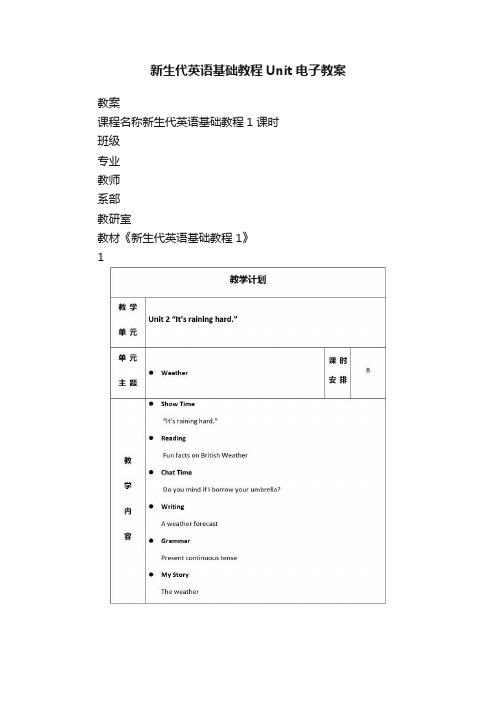
新生代英语基础教程Unit电子教案教案课程名称新生代英语基础教程1 课时班级专业教师系部教研室教材《新生代英语基础教程1》1345678补充教学资源VOCABULARY BUILDER参考译文SHOW TIME语言解析1. It’s ten after three.三点过十分了。
ten after three 三点过十分,这个短语相当于ten past three。
英语中表示“几点过几分”(半小时以内)可用after,也可用past;而表示“几点差几分”则用to,通常先讲分钟,再讲小时, 即after / past 或to前面的数字为分钟,后面的数字为小时。
e.g. 5:10 ten past five (ten after five)10:05 five past ten (five after ten)5:50 ten to six9:45 fifteen to ten2. The class is canceled because of the storm. 因为暴雨,课被取消了。
because of意思是“因为”,是一个介词短语,后面跟名词或动名词,构成介宾结构。
because是连词,后面跟句子。
9e.g. The plane didn’t take off because of the heavy rain.因为大雨,飞机没有起飞。
The plane didn’t take off because it was raining heavily.因为下大雨,飞机没有起飞。
3.Nobody came to class—except us.除了我们几个,没有人来上课了。
except 表示“除……之外”,强调所排除的“不包括在内”,一般表示同类之间的关系。
besides表示“除……以外还……”,有“不但……而且……”的意思。
e.g. The library is open every day except Mondays.除了星期一,图书馆每天都开放。
新生代英语高级教程1unit5
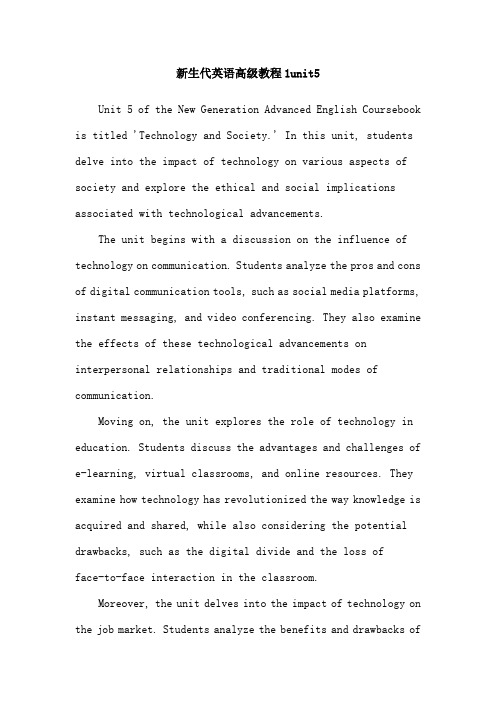
新生代英语高级教程1unit5Unit 5 of the New Generation Advanced English Coursebook is titled 'Technology and Society.' In this unit, students delve into the impact of technology on various aspects of society and explore the ethical and social implications associated with technological advancements.The unit begins with a discussion on the influence of technology on communication. Students analyze the pros and cons of digital communication tools, such as social media platforms, instant messaging, and video conferencing. They also examine the effects of these technological advancements on interpersonal relationships and traditional modes of communication.Moving on, the unit explores the role of technology in education. Students discuss the advantages and challenges of e-learning, virtual classrooms, and online resources. They examine how technology has revolutionized the way knowledge is acquired and shared, while also considering the potential drawbacks, such as the digital divide and the loss offace-to-face interaction in the classroom.Moreover, the unit delves into the impact of technology on the job market. Students analyze the benefits and drawbacks ofautomation and artificial intelligence, particularly in relation to employment opportunities and job security. They discuss the need for individuals to acquire new skills and adapt to the changing demands of the digital era.Additionally, Unit 5 addresses the ethical considerations associated with technology. Students explore topics such as data privacy, cybersecurity, and the ethical use of emerging technologies like facial recognition and biometrics. They engage in debates and discussions to develop critical thinking skills and ethical awareness in the context of technological advancements.To further enhance their language skills, students engage in various activities throughout the unit. These include reading articles and essays on technology and society, listening to audio recordings and podcasts, and participating in group discussions and presentations. They also work on vocabulary and grammar exercises specifically designed to reinforce the language points related to the unit's theme. In conclusion, Unit 5 of the New Generation Advanced English Coursebook offers students a comprehensive exploration of the impact of technology on society. It encourages critical thinking, fosters ethical awareness, and enhances languageskills, all while preparing students for the challenges and opportunities of the digital age.。
新生代英语基础教程Unit 5

新生代英语基础教程Unit 5概述本单元主要介绍了关于“家庭”这一话题的基本词汇和常用表达,旨在帮助学生快速掌握与家庭相关的基础英语知识,并能够运用这些知识进行实际交流。
主要内容1. 家庭成员的称呼在英语中,我们常常使用特定的称呼来称呼家庭成员。
以下是一些常见的家庭成员称呼:•父亲:father / dad / daddy•母亲:mother / mom / mommy•儿子:son•女儿:daughter•兄弟:brother•姐妹:sister•祖父:grandfather / grandpa•祖母:grandmother / grandma•外祖父:grandfather / grandpa•外祖母:grandmother / grandma•叔叔:uncle•阿姨:aunt•堂兄弟姐妹:cousin2. 家庭生活下面是一些与家庭生活相关的常用表达:•我们全家人都住在一起。
We all live together.•我的家人非常关心我的学习。
My family cares a lot about my education.•周末我们通常会一起去公园或者看电影。
We usually go to the park or watch movies together onweekends.•对我来说,家庭是最重要的。
Family is the most important thing to me.•我和我的兄弟姐妹关系非常好。
I have a great relationship with my siblings.3. 家庭活动家庭活动是家庭成员之间互动的重要组成部分。
以下是一些常见的家庭活动:•吃饭:have meals•看电视:watch TV•打扫房间:clean the room•一起做饭:cook together•看电影:watch movies•聊天:chat•出行:go on outings4. 家庭成员的性格特点每个人都有不同的性格特点,家庭成员也不例外。
新生代英语基础教程Unit 5
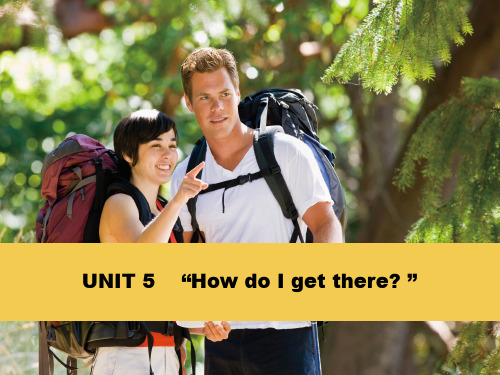
towards
in front of
next to
B
Complete the sentences with words from Exercise A.
diner 1 This __________ has the best food! You’ll love it. bookstore 2 Kelly loves to buy new books at the __________. straight 3 If you walk __________down this road, you will see the café. next to 4 The bakery is __________the supermarket. Right beside it. complicated I can’t understand it. 5 This map is so __________! blocks 6 Lisa walked six __________to get here. Now she is very tired. in front of the police station, 7 Where is City Hall? It’s__________ not behind it. towards 8 Michael walked __________the dog very slowly. LANGUAGE NOTE
参考译文
男士:对不起,我不是本地人。你能告诉我最近的银行在哪里吗? 女人:当然。你有地图吗? 男人:是的,我的确有。在这儿。 女人:是的……好吧……我们在莫里斯大街,银行就在那边的锡达街。 男人:好的。 女人:所以,你必须向北走三个街区,然后在到达锡达街的时候向左转。 男人:我明白了。 女士:银行紧靠邮局。你不会错过它的。 男士:谢谢你!祝你今天愉快! 女人:很高兴我能帮你。再见!
新时代大学英语第3版第1册unit 5

2
Despite the fact that I have tried to be objective, the book inevitably mirrors my own interests and experiences. 尽管我曾努力做到客观,但这本书还是
不可避免地反映出了我自己的兴趣和经历。
1
乘火车旅行是我最喜欢的旅行方式。
Fall is my favorite time of the year.
2
秋天是我一年中最喜爱的季节。
New Words
2. typical a. 典型的,有代表性的;(品质、性格等
方面)特有的,独特的
This sort of hot food is very typical of the food in the south of the country.
餐厅点餐篇
1. I’d like to have some local food. 2. May I have a menu, please? 3. May I order, please?
我想尝尝地方特色食品。 请给我菜单。 我可以点餐了吗? 餐厅最特别的菜是什么?
4. What is your specialty?
Waiter: Good evening. Do you have a reservation? Customer: Yes. The reservation is under Lin. Waiter: Very good, Mr. Lin. Do you prefer smoking or non-smoking seating? Customer: Non-smoking, please. Waiter: If you follow me, I will show you to your table. Customer: Thank you. Waiter: You’re welcome. Your server will be with you right away to take your drink order.
新起点大学基础英语教程 读写教程 第5单元 PPT课件
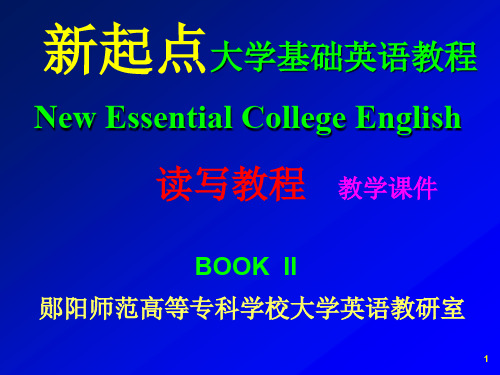
3
The latest in a long list of unacceptable
incidents involved a rock star’s concert last Friday.
The problems began with the preparation for the
show, which took place throughout the day on
4
While-reading Tasks
New Words and Expressions Text A
While-reading Questions Main Ideas
Detailed Study of the Text
5
New Words and Expressions
ban
fortunate def the Text
1. I am a resident of a flat on Broadwood Road, Happy Valley.
--- I live in a flat on Broadwood Road, Happy Valley.
2. My flat directly faces the stadium and for the past year or so, I have had to put up with noise pollution of the worst kind.
16
4. The problem began with the preparation for the show, which took place throughout the day on Friday.
--- The preparation for the show, which took place throughout the day on Friday.
- 1、下载文档前请自行甄别文档内容的完整性,平台不提供额外的编辑、内容补充、找答案等附加服务。
- 2、"仅部分预览"的文档,不可在线预览部分如存在完整性等问题,可反馈申请退款(可完整预览的文档不适用该条件!)。
- 3、如文档侵犯您的权益,请联系客服反馈,我们会尽快为您处理(人工客服工作时间:9:00-18:30)。
Have you ever played the game “Room Escape” (密室逃脱)? D Complete the clues with words from the boxes to help the three
people get out!
straight under on towards in next to in front of
tired. 7 Where is City Hall? It’s__in__f_ro_n_t_o_f_ the police station,
not behind it. 8 Michael walked _t_o_w_a_r_d_s___the dog very slowly.
LANGUAGE NOTE
Man: OK.
Woman: So, you have to walk (3)_th_r_e_e_b_l_o_c_k_s north, and then turn (4) __l_ef_t______when you get to Cedar Street.
Man: Got it.
Woman: The bank is (5) _n_e_x_t_t_o____the post office. You can’t miss it.
A
B
C
electronic map compass
paper map
D
E
landmarks asking for directions
VOCABULARY BUILDER
A Listen and repeat.
(city) Βιβλιοθήκη lockscomplicated
diner
bookstore
straight
towards
in front of
next to
B Complete the sentences with words from Exercise A.
1 This ___d_in_e_r____ has the best food! You’ll love it. 2 Kelly loves to buy new books at the _b_o_o_k_s_t_o_re__. 3 If you walk __s_tr_a_i_g_h_t __down this road, you will see the
Man: Thanks a lot! Have a nice day. Woman: Glad I could help. Bye!
参考译文
参考译文
男士:对不起,我不是本地人。你能告诉我最近的银行在哪里吗? 女人:当然。你有地图吗? 男人:是的,我的确有。在这儿。 女人:是的……好吧……我们在莫里斯大街,银行就在那边的锡达街。 男人:好的。 女人:所以,你必须向北走三个街区,然后在到达锡达街的时候向左转。 男人:我明白了。 女士:银行紧靠邮局。你不会错过它的。 男士:谢谢你!祝你今天愉快! 女人:很高兴我能帮你。再见!
Enter Room 2. Walk (4)__t_o_w_a_r_d_s__ the basket. There is a note (5) ___i_n______it. Read it: “(6)__N_e_x_t_t_o___the basket, there is a bed light. Turn on the light and you’ll know how to open the door.”
Woman: Sure. Do you have a (2) __m_a_p______?
Man: Yes, I do actually. Here it is.
Woman: Yes… OK… We’re here on Morris Street, and the bank is over
there on Cedar Street.
(city) blocks: 常见于美式英 语,“街区”的意思,即四 条街道围住的区域。美国的 城市道路很多都是横竖排列 的,井字形的一个格子就是 所谓的街区了。在大城市, 有时候一两个建筑物就是一 个街区。
C Listen and complete the conversation.
Man:
Excuse me, I’m not from around here. Could you please tell me where the nearest (1)__b_a_n_k_____ is?
UNIT 5 “How do I get there? ”
“How do I get there?”
VOCABULARY BUILDER
READING
UNIT5 CONTENTS
WRITING
MY STORY
SHOW TIME
CHAT TIME
GRAMMAR
WARM-UP
What do you usually rely on when you get lost? Rank the following from “the most useful to you” to “the least useful to you”.
Enter Room 1. Go (1) ____st_r_a_ig_h_t_to the desk. There is a box (2) ___u_n_d_e_r___it. Use the letters (3) ____o_n_____the wall to help you get the password for the box. Then open it, get the key and unlock the door.
café. 4 The bakery is __n_e_x_t_t_o___the supermarket. Right beside
it. 5 This map is so _co_m__p_l_ic_a_te_d_! I can’t understand it. 6 Lisa walked six ___b_lo_c_k_s___to get here. Now she is very
